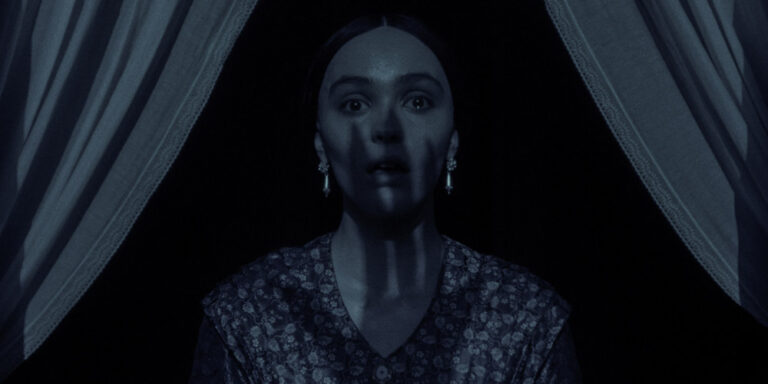![]()
Infinity Pool (2023) Directed by Brandon Cronenberg
I’m still having a lot of trouble trying to decipher the elusive goals of the heir to body horror, the son of the great David Cronenberg, and clearly Infinity Pool – the third transgressive cinematic venture in his fledgling filmography – doesn’t make this endeavor any easier, let alone more comprehensible. Brandon Cronenberg lives under the shadows of his father’s undisputed talent. The Cronenbergian trademarks that gave corporeality to anatomical horror and the mordant style that David Cronenberg cultivated throughout his career have left a universal imprint on every modern horror filmmaker; it was axiomatic to predict that Brandon Cronenberg’s oeuvre would incorporate these grotesque peculiarities into its formal aesthetic. However, I sense – and I express this very scrupulously – that Brandon Cronenberg with this new aberrant and thought-provoking product announces for the first time in his career stylistic self-sufficiency. I fail to understand why many venture to label or specify this film as yet another film in the body horror genre, nor do I comprehend why they would encapsulate it in the conventionality of a commentary on modern identity. It is delusional to think that this film pretends to be a version of David Cronenberg’s films but without steroids and without substance, for it is anything but. The contrast between Cronenberg and his son – speaking in filmic terms of course – is that the former is a filmmaker concerned with a highly physical materialism, the latter is fascinated with the metaphysical dilemmas of our existence. Intriguingly, Infinity Pool invests a reverberating force into exploring metaphysical territory, eschewing the Cronenbergian philosophy that his father’s cinema professes. Infinity Pool arguably showcases Brendan Cronenberg for the first time with an autonomous identity, a filmmaker with sovereign insights and idiosyncrasies that owe some homage to his father, but the effects are an emancipating voice of an artist with multi-faceted independence.
With Infinity Pool, Brandon Cronenberg has engendered a mind-bending work that simply refuses to be unraveled. Decoding the cerebral perversity that occurs in this film’s darkly hallucinogenic plot requires a very laborious hermeneutic; that’s what I celebrate most about this dizzying film, its eccentricities are so radical and its ambitions so plausible that it leaves you in a shaky doubt. It is hopelessly impossible to maintain neutrality with material of this nature, there is no middle ground, there are only two sides to the spectrum of reactions, you can either find it the most empty and pretentious film or you can find it the most daring sci-fi horror film of the last few years. Even in its most visceral dynamic, judgment becomes more vague and your capacity for thought is clouded by the ramifications of its more intellectual side. Upon witnessing the excessive violence in Infinity Pool’s plot I was hooked and obfuscated by its exploitative proclivities but then, with telling immediacy, I was overwhelmed by its superlative ability to use violence as part of its sociopolitical rhetoric. The film should be viewed on two distinct planes. The first should be viewed on an extremely self-critical realistic plane and the second on a very metaphorical fictional plane. By being aware of these two dimensions throughout the course of the film you will be astonished at how well they coexist despite their antithetical natures.
Infinity Pool takes place in the fictional country of Li Tolqa, a country far removed from the privileges of the first world but which has isolated, private and secure tourist areas for foreigners to enjoy during the summer vacations. Frustrated novelist James Foster, played by Alexander Skarsgård, and his wealthy wife Em, played by Cleopatra Coleman, are spending a pleasant vacation in that tourist paradise, staying in a beautiful beachfront hotel. Their tranquil existence is disturbed by a friendly couple -also foreigners- who invite them to dinner. This meddlesome couple consists of Gabi Bauer, played with startling sensuality and ferocity by Mia Goth, and her husband, played by Jalil Lespert. There comes a pivotal point in the plot where this outwardly amicable relationship between these people monstrously morphs into something ominous, hostile at times and tantalizing at others. James and Em’s luck changes drastically when a car accident occurs. James, driving drunk on a pitch black road, crashes into a villager crossing the road, killing him instantly. As a result, the police arrest James and Em. The police of this unspecified country with volatile politics, offers them certain conditions to avoid being executed, one of them is that James has to agree to be cloned so that the latter can be executed by the victim’s relatives and he must also pay a high sum of money to be released. After agreeing to the sinister and bizarre deal, James and Em are released. Em, traumatized, wants to get out of this corrupt country as soon as possible, but James seems to be so beguiled by the hedonism of his new friends and the mysteries of cloning that he prefers to stay and explore the insane debauchery of the place.
During the twisted story we see that many clones of James are made, as well as many clones of other people. The disturbing thing about this fact is that the script exploits this factor as a suspicious trigger, something that intensely arouses in us an unsettling sensation. Every time one of these unpleasant executions happens, we wonder: How can we know who the real James is? The question becomes even more disquieting as we observe his mental sanity deteriorate as the days go by. Mia Goth, as the duplicitous and pernicious Gabi, is the wild spirit of the film and probably the most essential character. Goth has deservedly earned her status as the quintessential 21st century horror actress. I really don’t think the film would work as well, nor would its erotic euphoria be as infectious, if it weren’t for the lunatic expressionism of Mia Goth’s performance. Alexander Skarsgård – who is slowly becoming one of my favorite actors – delivers a versatile performance, an uncanny encounter with madness and different facets of a corrupted psychology. The obsessive attention Brandon Cronenberg devotes to these two actors is crucial to exacerbate the ambitious enormity of his themes. Not everything is functional, not everything is uniformly filmed, but the rationale for many passable flaws can be found in the unbridled passion with which each frame reveals one idea crazier than the next. It is an arduous but mesmerizing journey.
Delving more into its satirical vein, Infinity Pool declares itself a crude manifesto against totalitarian states. Yet its critical undertones are analogously harsh on Western democracies. Brandon Cronenberg deals with tricky issues, particularly in his draconian treatment of bourgeois frivolity in Third World countries. Beforehand I must warn that my analysis is hypothetical -although a part of my intuition tells me that my analysis is correct- and therefore there may be some loopholes in my arguments. To begin with, the simple fact that Li Tolqa is a fictitious country vilely representing the third world bureaucracy implies that the script is surreptitiously trying to convey something in the tone of social criticism. Corruption in countries with precarious socio-economic conditions are usually places where ruthless and tyrannical politicians abound, and where curiously the only ones affected by authoritarianism are the lower classes. The elite, like the tourists we see in Infinity Pool, are the only ones untouchable by the political and bureaucratic class, they pay to get out of their problems. This is where the most mystifying feature comes to the surface in its most subliminal textures. The fact that these tourists are foreigners, children of the first world and the facilities of capitalist society makes the comparison between the modus operandi of corruption in Li Tolqa a kind of contentious allegory that aims more than to expose the totalitarian infamies of that country, it seeks to dismantle many of the flaws of our so-called democracy.
I’m not quite sure how a film so chameleonic in style and turbulent in its overall execution will age, but I’m convinced I’ve witnessed something relevant, exciting and confounding. The philosophy of Infinity Pool will surely make many feel alienated, others will feel nauseous, I felt as if I was trapped in a bad psychedelic trip where it matters more what it made you think than what you felt. As I pointed out at the beginning of this review, Brandon Cronenberg is more concerned with existential metaphysics, he levitates his visuals to an otherworldly realm, and seemingly there much of our material reality is revealed. The film confronts many universal conundrums that only vindicate the hostility of its hyper-violent vision of the perversion of the modern man. This is a landmark piece of 21st century horror cinema.









